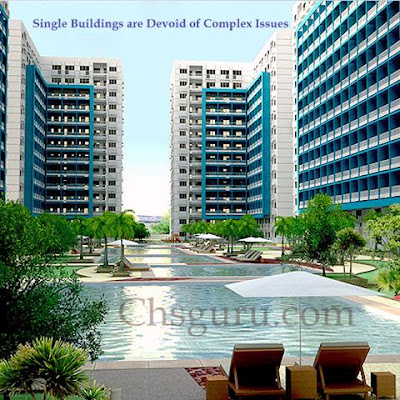In the last decade,
instead of going for a flat
in a Single /Stand alone building, most
home buyers opted for a flat
in a Big Complex
considering the surge of amenities
provided by builders/ developers.
Adv. R. P. Rathod says
that it's important for the home buyers
to realize
the Legal ramifications
of living in a Housing Complex which are no
doubt unique
in nature. Incidentally, all the flat buyers
in Maharashtra,
whether buying a house
in a single building or in a big Complex,
are covered by the Maharashtra Flat
Ownership Act 1963.
Enthralled
with the prospect of having Children's
Play grounds, Health Clubs, Swimming pools,
bus services and the other facility
in and around the Housing Complex,
very often buyers are
lured to opt for Complexes
which promise the stars
without realizing the Legal
ramifications which arise concurrently says Adv. R. P. Rathod.
Firstly,
as far as the conveyance
is concerned,
the builder
has to make conveyance
with respect to an individual society. As
per the provisions of Law, the Land
on which
the building
is standing, in additional to the land appurtenant
to it, shall be owned by the society
of one building only and
will be entitled to benefit from
that additional F.S.I.
Secondly,
in the case of Building Repairs, when separate
societies are created within one Housing Complex,
it works out to be a lot better
for the buyer. In case a particular
society's members fail to pay up
the rest of the buildings'
members don't have to suffer as a consequence.
Even in case, one society defaults in the payment
of Property Tax,
Municipal tax
and other Tariffs, the other societies
aren't affected, he adds.
As per
the provisions
of the MOFA 1963 it is the duty of a builder/
developer to register
a CHS
within a period
of 4 months as soon as 60%
of flats
are sold.
Now in case of a single
stand-alone building, it makes
sense to form one society, but in the case
of a Housing Complex, it's lot more
convenient
of forming
different societies of different wings.
Very often, the builder to save on a lot
of hassle &
money opts to form just one CHS
of all wings
in a Housing Complex. However Adv. R. P. Rathod
points out that, as per the rules
governing formation of CHS
it is mandatory that separate
societies should be formed of different wings.
 He
further adds that in case, a single society
is formed
of a Large Housing Complex;
several issues arise owing to its very size.
It's lot more difficult even to control
and attend
the regular issues
that affect the residents
such as water, power and maintenance
in such cases
becomes a big hassle. Logically
it would have been a lot easier
if several societies
were formed. That way, each society could have
its own Bye-laws and ensure
their statutory compliance a
lot more efficiently
than if they were all merged
into one. He further emphasis
that in case there are 7 wings
in a complex and a single society
is formed, members generally think
that they would have atleast one member from each building
to represent them
in the committee, but legally speaking that would
be incorrect.
CHS has
to follow certain democratic provisions,
which means that you cannot divide seats building
wise/ wing wise, it is illegal
to do so. What this means? There
is high possibility
that a committee is formed,
which consist of members only from
one or two wings & it’s oblivious
that these members would
be more
concerned about their wings,
this eventually leads to mismanagement
& disputes among members.
He
further adds that in case, a single society
is formed
of a Large Housing Complex;
several issues arise owing to its very size.
It's lot more difficult even to control
and attend
the regular issues
that affect the residents
such as water, power and maintenance
in such cases
becomes a big hassle. Logically
it would have been a lot easier
if several societies
were formed. That way, each society could have
its own Bye-laws and ensure
their statutory compliance a
lot more efficiently
than if they were all merged
into one. He further emphasis
that in case there are 7 wings
in a complex and a single society
is formed, members generally think
that they would have atleast one member from each building
to represent them
in the committee, but legally speaking that would
be incorrect.
CHS has
to follow certain democratic provisions,
which means that you cannot divide seats building
wise/ wing wise, it is illegal
to do so. What this means? There
is high possibility
that a committee is formed,
which consist of members only from
one or two wings & it’s oblivious
that these members would
be more
concerned about their wings,
this eventually leads to mismanagement
& disputes among members.
To
Conclude
with he says that there are myriad benefits of living
in a Housing Complex as compared
to a single/ Stand-alone buildings, however the home buyers
need to realize the Legal Complications
that could arise from their decision.
It could be higher monthly outgoings
as compared
to single/ stand alone properties and repeated failure on the part
of these huge groups of home owners
to cater in the
case of a colossal complex.












.jpg)






.png)
.png)